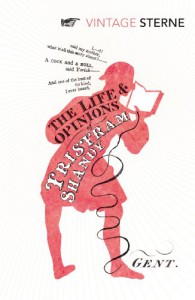The Life and Opinions of Tristram Shandy, Gentleman - Laurence Sterne

Whatever I was expecting when this turned up on my university reading list, it wasn't this.
The Life and Opinions of Tristram Shandy, Gentleman, published (unbelievably, for reasons that shall become clear in a moment) in 1759, is a novel (perhaps) following the perenially unlucky, not to say ridiculous, Tristram Shandy on his way through life (sort of). I was thinking of something along the lines of Tom Jones, crossed perhaps with David Copperfield, a picaresque-type Bildungsroman, just groundbreaking enough for us to admire it faintly condescendingly from this far-off point in time: "It may seem commonplace now, but two hundred years ago it was Shocking and New..." That kind of thing.
What I actually got was something I can only describe as an eighteenth-century Gravity's Rainbow.
You see, Tristram, our narrator, is incapable of telling a linear narrative. He'll begin with one anecdote, and digress into an extended character sketch, and launch from there into a philosophical treatise on baptism in French, and wind up in the middle of a completely different anecdote whose beginning is at best obscure and at worst impenetrable. There are typographical tricks, blank pages and one-sentence chapters, and one extended portion that reads, I kid you not, like a cross between Catch-22 and the weirder bits in The Sound and the Fury.
I repeat that this was published in 1759.
I have to admit that I didn't like it very much. Sure, I understand that it's kind of a satire of sorts, a Scriblerian joke like a more extreme version of The Dunciad, and that it's all very witty and postmodern and profound.
But you can be witty and postmodern and profound and tell a good story, which is one thing Sterne doesn't achieve. This may be partly because of the eighteenth-century idiom - it's quite possible that, for a contemporary audience, it was as fascinatingly weird and relevant as Gravity's Rainbow is for us - and, of course, I might just be a terrible philistine (I've never really liked Catch-22 or The Sound and the Fury, anyway), but it does seem to me that the joke of Tristram Shandy is kind of old by page 300, and is redundant beyond that. There's certainly no real plot to speak of - Tristram doesn't even manage to get born for 200 pages - and, for me, the fragmented, digressive narration was actually quite annoying.
This makes rating the thing rather difficult. Clearly, it is a groud-breaking, nay revolutionary, work of literature; on the other hand, I'm really glad I don't have to read it any more. Two stars, then, but only because I can't in all conscience give it any less.
 4
4
 3
3


